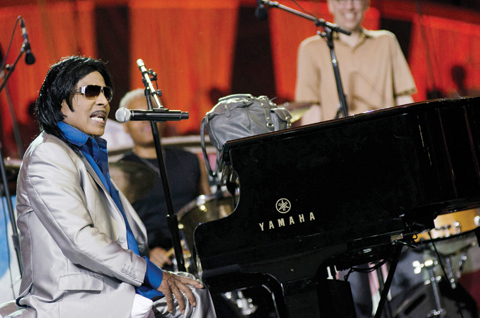 This file photo taken on July 2, 2011 shows Little Richard performing during the annual PBS “A Capitol Fourth” concert at the US Capitol in Washington, DC. — AFP
This file photo taken on July 2, 2011 shows Little Richard performing during the annual PBS “A Capitol Fourth” concert at the US Capitol in Washington, DC. — AFP
The world had never heard anything quite like it. With his ferocious howl and lightning-quick piano, Little Richard fired an opening salvo of what would be called rock 'n' roll. Sixty years after his seminal album "Here's Little Richard," a newly reissued edition offers a closer look at Richard the musician and how he honed a style that influenced so much that was to come. In an age of singles, the original 12-inch LP in 1957 collected the early hits of rock's original wild man -- "Long Tall Sally," "Rip It Up" and, most famously, "Tutti Frutti."
The reissue features a crisp, remastered sound that brings out Richard's vocal power and a second CD of demos and outtakes, showing Richard in firm control with only occasional revisions during recording. "People say Little Richard is a wild man. But he was very professional in the studio and they nailed these songs together pretty quickly," said Chris Morris, a music scholar who helped oversee the 60th anniversary edition for Craft Recordings.
The reissue includes a more subdued take on "Baby," recorded while Richard was still in his native Macon, Georgia. But "Tutti Frutti," a staple of Richard's live performances that playfully described anal sex, came together in the studio in just 15 minutes. With the nonsensical but somehow instantly understood opening line -- "Awop bop a loo mop / Alop bam boom" -- "Tutti Frutti" summed up the spirit of rock 'n' roll with its infectious rhythms and whiff of naughtiness, even if Bumps Blackwell, the producer for Specialty Records, had the raunchy original lyrics rewritten.
Richard became one of the first entertainers to reach mass black and white audiences together and triggered a craze that stunned 1950s sensibilities, with women throwing their underwear on stage and several fans at a concert in Baltimore prevented from jumping off the balcony in euphoria. The Beatles, who would soon cause similar scenes, considered Richard a mentor and played as his opening act in England. David Bowie, fascinated by Richard's other-worldly persona, said Richard inspired him to learn saxophone and take up music.
'Attacking the piano'
In the mid-1950s, there were few like Richard. Chuck Berry was charting a parallel path to rock 'n' roll on his guitar, while Elvis Presley and Jerry Lee Lewis, two white artists heavily influenced by Richard, were just starting out. The star who sounded most like Richard was Fats Domino, the joyful boogie-woogie legend who died last month at age 89. But the self-effacing pianist was far different than Richard.
"Fats was this very charming, avuncular guy -- a big fat guy who played this rolling New Orleans piano," Morris said. "Richard arrives and he's attacking the piano; he's banging on it. He's not crooning; he's screaming. There had never really been a figure who came out of R&B who was that extroverted or loud or wild," he said. Richard, who turns 85 in December, was not involved in the reissue and has made few public appearances in recent years.
But Richard, at once one of rock's flashiest and most conflicted personas, suddenly gave a lengthy interview last month to a Christian television station in southern Illinois. Once famous for his hotel orgies before a series of born-again conversions, Richard has apparently entered a fresh deeply religious phase. He newly renounced his past homosexuality -- a concept of choice in orientation that is anathema to the modern gay rights movement and mainstream psychologists. Asked how he would redo his life, Richard -- still sprightly and sporting sequined sneakers -- said he would be a preacher. - AFP

